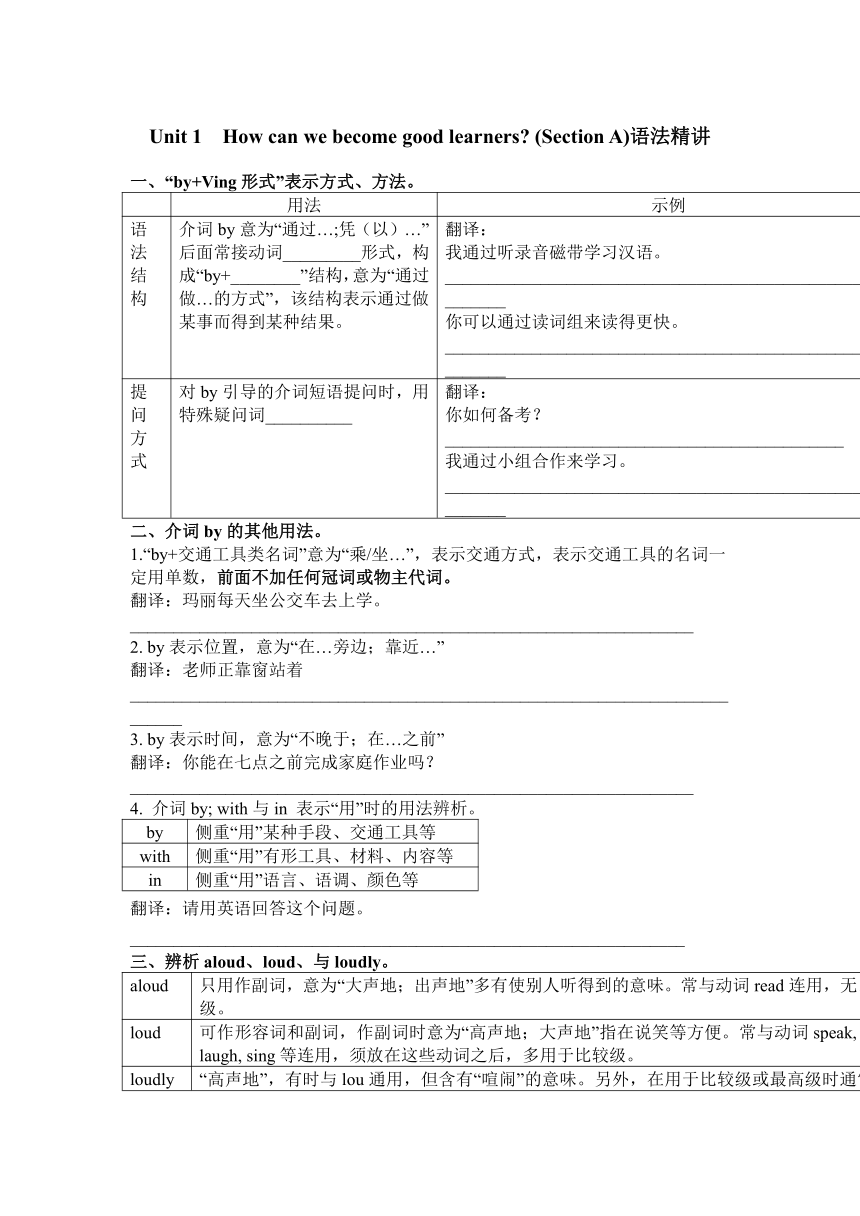Unit 1 How can we become good learners. section A 语法精讲 (无答案)
文档属性
| 名称 | Unit 1 How can we become good learners. section A 语法精讲 (无答案) |  | |
| 格式 | docx | ||
| 文件大小 | 20.3KB | ||
| 资源类型 | 教案 | ||
| 版本资源 | 人教新目标(Go for it)版 | ||
| 科目 | 英语 | ||
| 更新时间 | 2023-08-24 14:55:49 | ||
图片预览

文档简介
Unit 1 How can we become good learners (Section A)语法精讲
一、“by+Ving形式”表示方式、方法。
用法 示例
语法结构 介词by意为“通过…;凭(以)…”后面常接动词_________形式,构成“by+________”结构,意为“通过做…的方式”,该结构表示通过做某事而得到某种结果。 翻译: 我通过听录音磁带学习汉语。 __________________________________________________________ 你可以通过读词组来读得更快。 __________________________________________________________
提问方式 对by引导的介词短语提问时,用特殊疑问词__________ 翻译: 你如何备考?______________________________________________ 我通过小组合作来学习。 __________________________________________________________
二、介词by的其他用法。
1.“by+交通工具类名词”意为“乘/坐…”,表示交通方式,表示交通工具的名词一定用单数,前面不加任何冠词或物主代词。
翻译:玛丽每天坐公交车去上学。_________________________________________________________________
2. by表示位置,意为“在…旁边;靠近…”
翻译:老师正靠窗站着___________________________________________________________________________
3. by表示时间,意为“不晚于;在…之前”
翻译:你能在七点之前完成家庭作业吗?_________________________________________________________________
4. 介词by; with与in 表示“用”时的用法辨析。
by 侧重“用”某种手段、交通工具等
with 侧重“用”有形工具、材料、内容等
in 侧重“用”语言、语调、颜色等
翻译:请用英语回答这个问题。________________________________________________________________
三、辨析aloud、loud、与loudly。
aloud 只用作副词,意为“大声地;出声地”多有使别人听得到的意味。常与动词read连用,无比较级。
loud 可作形容词和副词,作副词时意为“高声地;大声地”指在说笑等方便。常与动词speak, talk, laugh, sing等连用,须放在这些动词之后,多用于比较级。
loudly “高声地”,有时与lou通用,但含有“喧闹”的意味。另外,在用于比较级或最高级时通常用loud.
翻译:朗读课文与大声地读课文是有区别的。______________________________________________________________
四、重点句型: It’s too hard to understand spoken English.翻译:________________________________________________
(1) it在句中作形式主语,真正的主语是________________________________________________.这句话包含的句型是_______________________________________ (2) too …to意为_____________________.是_______定结构。too是副词,后接___________________,to是动词不定式符号,后接_____________________.
(3)too...to结构常与_______________________结构互换。
翻译:这个女孩太小了,还不能去上学。_____________________________________________________________
_____________________________________________________________
五、重点句型:I want to learn new words and more grammar so that I can have a better understanding of English movies.
so that引导__________________,意为______________________,同义结构为____________________,其从句中的谓语动词常和can, may, should等情态动词连用。
课后练习
用所给词的适当形式填空。
1. She can become a good learner by __________ (make) word cards.
2. Does _______________ (someone) often arrive late for school
3. They like having___________________ (conversation) with foreigners.
4. That__________ (real) improves her___________ (speak) skills.
5. Let's read aloud ________________ (practice) our __________________ (pronounce).
6. The box is too heavy for him________________ (carry).
7. You should improve your ______________ (speak) English.
8. It takes me half an hour___________ (get) to school.
9. The__________ (hard) you study, the better grades you will get.
10. Last night I met a beautiful girl__________ (call) Li Yan at the supermarket.
选择填空
( )1.__________our teacher is ill,__________ he still comes to our class to teach us.
A. Though; but B. Though; / C. Although; but D. Because; so
( )2. You can improve you English____________practicing more.
A. by B. with C. of D.in
( )3.—There was thick haze(雾霾)in our city this spring. What do you think of it
—I think ____________cars we drive, ______________ pollution our city will have.
the fewer; the fewer B. the fewer; the less
C. the more; the fewer D. the more; the less
( )4. The math problem is so hard. I really don’t know____________
A. how to do it B. how to do C. what to do it
( )5. CCTV-10 often plays __________ around the world. It can help us learn more about not only nature but also different cultures and customs.
A. new something B. something new C. anything new
一、“by+Ving形式”表示方式、方法。
用法 示例
语法结构 介词by意为“通过…;凭(以)…”后面常接动词_________形式,构成“by+________”结构,意为“通过做…的方式”,该结构表示通过做某事而得到某种结果。 翻译: 我通过听录音磁带学习汉语。 __________________________________________________________ 你可以通过读词组来读得更快。 __________________________________________________________
提问方式 对by引导的介词短语提问时,用特殊疑问词__________ 翻译: 你如何备考?______________________________________________ 我通过小组合作来学习。 __________________________________________________________
二、介词by的其他用法。
1.“by+交通工具类名词”意为“乘/坐…”,表示交通方式,表示交通工具的名词一定用单数,前面不加任何冠词或物主代词。
翻译:玛丽每天坐公交车去上学。_________________________________________________________________
2. by表示位置,意为“在…旁边;靠近…”
翻译:老师正靠窗站着___________________________________________________________________________
3. by表示时间,意为“不晚于;在…之前”
翻译:你能在七点之前完成家庭作业吗?_________________________________________________________________
4. 介词by; with与in 表示“用”时的用法辨析。
by 侧重“用”某种手段、交通工具等
with 侧重“用”有形工具、材料、内容等
in 侧重“用”语言、语调、颜色等
翻译:请用英语回答这个问题。________________________________________________________________
三、辨析aloud、loud、与loudly。
aloud 只用作副词,意为“大声地;出声地”多有使别人听得到的意味。常与动词read连用,无比较级。
loud 可作形容词和副词,作副词时意为“高声地;大声地”指在说笑等方便。常与动词speak, talk, laugh, sing等连用,须放在这些动词之后,多用于比较级。
loudly “高声地”,有时与lou通用,但含有“喧闹”的意味。另外,在用于比较级或最高级时通常用loud.
翻译:朗读课文与大声地读课文是有区别的。______________________________________________________________
四、重点句型: It’s too hard to understand spoken English.翻译:________________________________________________
(1) it在句中作形式主语,真正的主语是________________________________________________.这句话包含的句型是_______________________________________ (2) too …to意为_____________________.是_______定结构。too是副词,后接___________________,to是动词不定式符号,后接_____________________.
(3)too...to结构常与_______________________结构互换。
翻译:这个女孩太小了,还不能去上学。_____________________________________________________________
_____________________________________________________________
五、重点句型:I want to learn new words and more grammar so that I can have a better understanding of English movies.
so that引导__________________,意为______________________,同义结构为____________________,其从句中的谓语动词常和can, may, should等情态动词连用。
课后练习
用所给词的适当形式填空。
1. She can become a good learner by __________ (make) word cards.
2. Does _______________ (someone) often arrive late for school
3. They like having___________________ (conversation) with foreigners.
4. That__________ (real) improves her___________ (speak) skills.
5. Let's read aloud ________________ (practice) our __________________ (pronounce).
6. The box is too heavy for him________________ (carry).
7. You should improve your ______________ (speak) English.
8. It takes me half an hour___________ (get) to school.
9. The__________ (hard) you study, the better grades you will get.
10. Last night I met a beautiful girl__________ (call) Li Yan at the supermarket.
选择填空
( )1.__________our teacher is ill,__________ he still comes to our class to teach us.
A. Though; but B. Though; / C. Although; but D. Because; so
( )2. You can improve you English____________practicing more.
A. by B. with C. of D.in
( )3.—There was thick haze(雾霾)in our city this spring. What do you think of it
—I think ____________cars we drive, ______________ pollution our city will have.
the fewer; the fewer B. the fewer; the less
C. the more; the fewer D. the more; the less
( )4. The math problem is so hard. I really don’t know____________
A. how to do it B. how to do C. what to do it
( )5. CCTV-10 often plays __________ around the world. It can help us learn more about not only nature but also different cultures and customs.
A. new something B. something new C. anything new
同课章节目录
- Unit 1 How can we become good learners.
- Section A
- Section B
- Unit 2 I think that mooncakes are delicious!
- Section A
- Section B
- Unit 3 Could you please tell me where the restroom
- Section A
- Section B
- Unit 4 I used to be afraid of the dark.
- Section A
- Section B
- Unit 5 What are the shirts made of?
- Section A
- Section B
- Review of Units 1-5
- Unit 6 When was it invented?
- Section A
- Section B
- Unit 7 Teenagers should be allowed to choose their
- Section A
- Section B
- Unit 8 It must belong to Carla.
- Section A
- Section B
- Unit 9 I like music that I can dance to.
- Section A
- Section B
- Unit 10 You're supposed to shake hands.
- Section A
- Section B
- Review of Units 6-10
- Unit 11 Sad movies make me cry.
- Section A
- Section B
- Unit 12 Life is full of the unexpected
- Section A
- Section B
- Unit 13 We're trying to save the earth!
- Section A
- Section B
- Unit 14 I remember meeting all of you in Grade 7.
- Section A
- Section B
- Review of Units 11-14
